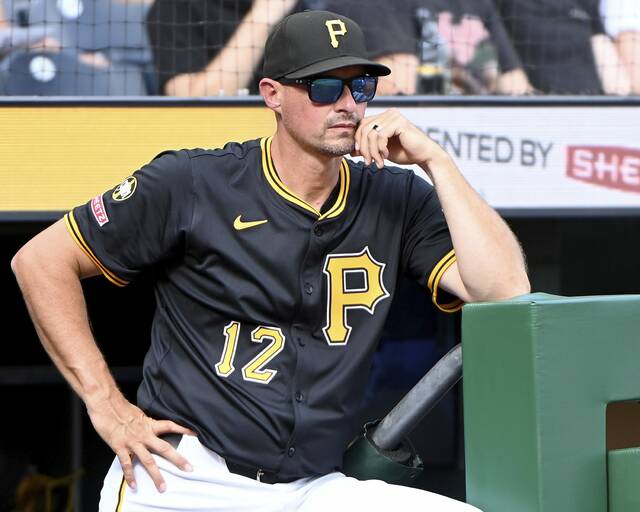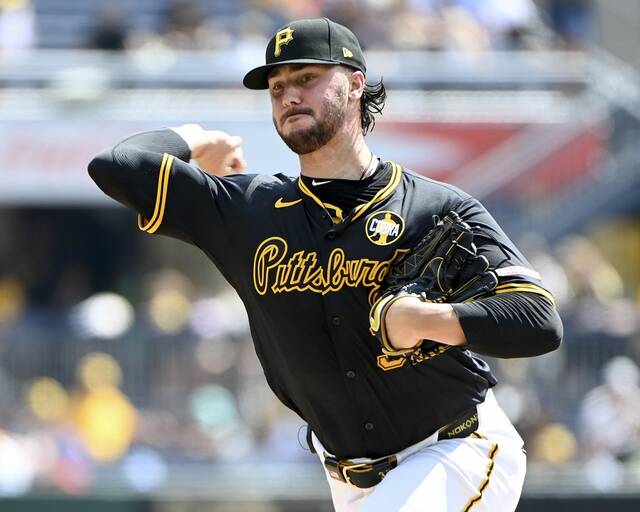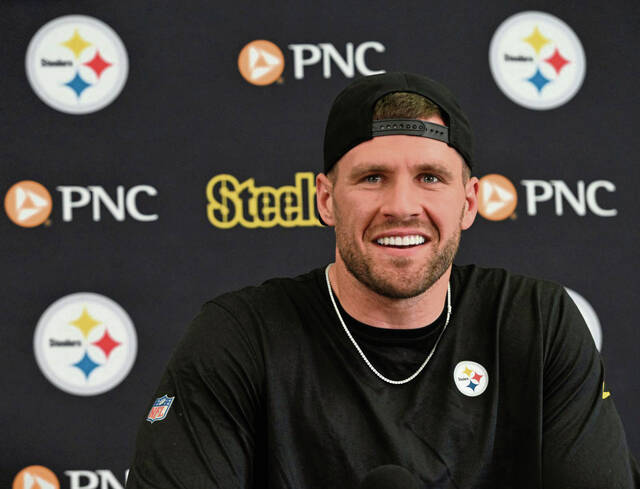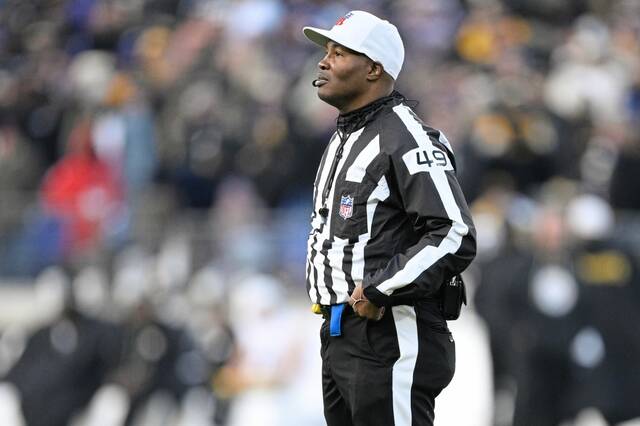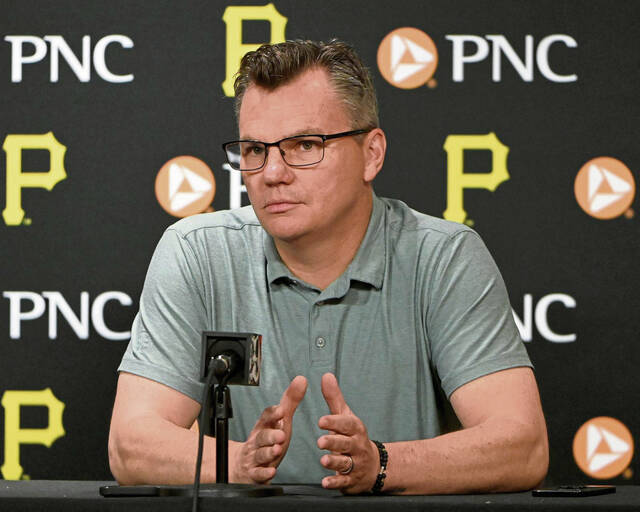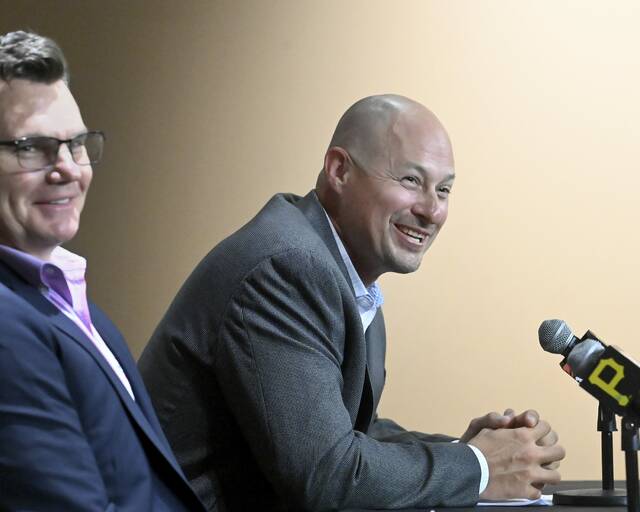Rich Hill is the oldest pitcher in baseball, with more salt than pepper in his beard but fewer ice packs on his body than the average fan would expect from a 43-year-old in his 19th season in the major leagues.
If you were expecting Hill to resemble Eddie Harris, the aging spitballer from the movie “Major League” whose body was covered in Crisco and Vaseline, think again.
Hill is a surprising story, no doubt, for an underdog team that was in first place in the NL Central until Friday, but the Pittsburgh Pirates knew they weren’t getting a broken-down starter when they signed the 6-foot-5, 221-pound left-hander to a one-year, $8 million contract.
“No, he’s in good shape. He takes care of himself,” Pirates manager Derek Shelton said. “It didn’t surprise me at all because the guys I’ve been around that played later into their career realize how important it is. There’s definitely an appreciation for it. He’s a 43-year-old guy. If you watch him on a day-to-day basis, how he takes care of his body and how diligent he is with a routine, it shows why he’s been able to do it so long. He’s one of those older-school guys that pays attention to every part of his craft, and I think that’s why he’s been able to do it this long.”
Hill adheres to a strict regimen between starts that allows him to pitch every five days — although he’ll get an extra day off between his last start Wednesday against Colorado and his next scheduled start Tuesday at Detroit — and shared some of his routine with the Tribune-Review this past week.
The day after he pitches, Hill does lower-body weightlifting and light dumbbell resistance exercises for shoulder strength with a trainer and cardio work for duration. Where the focus is on elongating the muscles the first day, the second day is a condensed version designed to shorten them. Hill does upper-body weight training with a focus on shoulder stability and sprint work.
On the third day, Hill rides an Airdyne bike for a two-mile sprint under five minutes to elevate his heart rate in a short time. The key is a core routine he learned from Boston Red Sox assistant trainer Masai Takahashi two years ago, adding a new wrinkle to Hill’s routine. It is designed to increase flexibility and mobility and thereby reduce the risk of injury. Hill wrote down and shared the core workout with fellow starter Johan Oviedo, 25, who is 6-5, 245 pounds.
“It’s nothing crazy,” Oviedo said, “but it keeps your body in shape.”
Finally, on the day before Hill pitches, he does sprinting that includes a ladder program and concentrates on the lower half but using only his body weight. The routine has remained consistent for Hill, who emphasizes that his approach isn’t entirely on the physical side.
“Nobody sees the behind the scenes,” Hill said. “That’s the one thing that’s so valuable to realize, the mental side of the game. You can’t quantify it. You can put a number on someone’s mental acuity or ability to adapt and adjust to things you can’t control. That’s a huge part of being professional, just showing up every day and doing the work and the consistency of the work. You don’t see that. You just see the finished product, right?”
‘When he speaks, guys listen’
If there’s a secret to Hill’s longevity, it’s not just a workout routine. That has changed dramatically over the past two decades but has remained a constant for Hill since undergoing Tommy John surgery on his left elbow in 2011, which altered the course of his career.
Hill believes it comes down to mental strength.
After starting 70 games in his first five seasons, Hill moved to the bullpen for the next five. There, he watched closely the routines of relievers, the violence with which they threw and their preparation. While with the Chicago Cubs, he watched Ryan Dempster go from a closer who recorded 85 saves over a three-year span to an All-Star starter who went 17-6 with a 2.96 ERA in 206 2/3 innings over 33 starts in 2008.
What impressed Hill was how Dempster’s mental approach to doing the work on a daily basis.
“No matter how good or how bad he felt, he was always very consistent in his routine,” said Hill, who has played with six Cy Young winners. “Over the course of my career, seeing other guys that were elite performers, seeing them being excited to play every single day and really love the game. I don’t think a lot of guys hang around long if you don’t have that love or passion for the game because there’s so much failure. The game requires so much discipline in that realm of having OK outings and then really good outings and then poor outings. How do you stay consistent throughout the course of a season?”
It taught Hill to put performances like Wednesday’s 4-3 loss to the Rockies, when he lasted only 3 2/3 innings, behind him and return to the routine. That means lifting weights and doing sprints and riding the bike after every outing, win or lose, whether he pitched well or poorly.
Hill’s reverence for his craft hasn’t gone unnoticed by Pirates pitchers.
“It’s just unbelievable the presence he has out there,” said Pirates pitching coach Oscar Marin, 40, who is almost three years younger than Hill. “When he speaks, guys listen.”
Hill’s mentality has rubbed off on the Pirates’ pitching staff. That’s especially true for staff anchor Mitch Keller, whose locker is next to Hill’s in the clubhouse. Keller marvels at Hill’s focus on his recovery, sharing that there is no secret to his success other than putting in the work.
“The biggest takeaway that I’ve come to learn just from talking to him is to go about your preparation, no matter how the night before went,” Keller said. “Good or bad, make sure you’re taking the next day and the days after that the same. That’s the only way you can get better and get ready to pitch all 32 starts.”
Flipping the switch
Hill has only made 32 starts once in his career, going 11-8 with a 3.92 ERA in 195 innings in 2007 – when most of the pitchers in the Pirates rotation were still in middle school. But he has thrown 1,300 innings in 358 appearances in his major-league career. The rest of the Pirates starting rotation has a combined 1,461 career innings.
After pitching with a partially torn UCL in 2019 — that involved pain so intense he couldn’t throw a baseball 10 feet the day after a start — Hill opted against another Tommy John surgery and instead elected to do an experimental “primary repair” procedure performed by Dr. Jeffrey Dugas that uses tape to form an internal brace around the ligament.
The decision to do so was for his long-term health, but it also helped revive his career. In 2021, at age 41, Hill made 31 starts and pitched 158 2/3 innings in a season split between the Tampa Bay Rays and New York Mets. Last year, he made 26 starts and pitched 124 1/3 innings for the Red Sox.
While tossing 41 1/3 innings in eight starts this season, Hill (3-3, 4.35 ERA) has impressed his teammates with his level of intensity. For as calm as he carries himself in the clubhouse, Hill has a reputation for his ultra-competitive side. His grunts can be heard with every pitch, and his temper can be cause for occasional outbursts in the dugout.
“We can do all this stuff, but when we get between the lines, you have to have a switch to turn on the competitive side of what you’re doing,” Hill said. “All of that goes out the window. Baseball doesn’t care if you got enough sleep. It doesn’t care what you ate. It doesn’t care what kind of work you put in. It just matters if you go out there — and this is something I always talk about removing yourself from — and get the results.
“If you can remove yourself from the results and live in the moment, that’s obviously easier said than done. You want to see the results, but you also have to be cognizant of how the ball is coming out of your hand. That’s really what you should be focusing on. I fail at that a lot. I have that perfectionist mentality where you’re striving for it knowing that you’re not going to reach it. That’s part of what a lot of guys, I would guess we’re all striving for. It’s tough to attain. You’re always pushing to search for it. That’s the big side of playing at this level: the percentages are so thin but where do you make up those percentages is the mental side of the game.”
Hill’s four-seam fastball sits at 87.4 mph — it didn’t touch 90 mph until April 29 at Washington, his sixth start — so he relies on his curveball and mixes in a cutter and sweeper and throwing from different arm angles to keep hitters guessing. His approach has made an impact on the Pirates, and not just the pitchers.
“It’s something you see and you appreciate because there aren’t many people his age that are competing on a professional level in any sport,” Pirates outfielder/designated hitter Andrew McCutchen, 36, said. “It’s unique and it’s cool to see him go after it every day and still have that hunger to do well and to compete.”
That’s where Hill believes the mental toughness always has him returning to his routine, giving him an advantage over younger starting pitchers still searching for answers. He knows his daily regimen, so it requires little to no thought. He just comes in and does his workout, like clockwork, between every start knowing that it’s designed not for improvement but rather for consistency.
“You really know what is going to be required of you and you go and get it done,” Hill said. “Of course there are days where you don’t feel like going to the gym or you don’t feel like running but you do it because it’s required. I know a lot of people talk about it, not wanting to do it but you just do it. You do the work. That’s something that is extremely valuable.”








